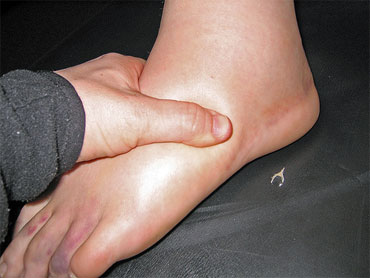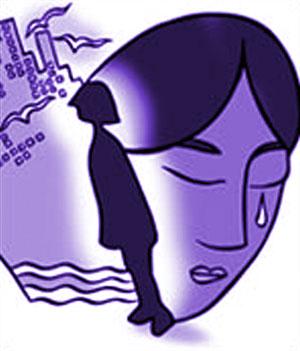Photographs: ColonCancerSymptoms / Creative commons Payal Banka, Lifemojo
Our bodies are good at telling us when something is wrong most of the time. It is important to listen to those messages and seek medical attention when specific symptoms arise.
Some signs are obvious not to ignore; heavy bleeding, difficulty breathing, pain in chest or abdomen.
But there are some symptoms that you may not be aware merit attention. They may seem so trivial that you are sure they will go away. However, even when those health problems go away you may still need to go see a doctor.
In the following slides we have listed 13 health symptoms you should not ignore. If you have or have had any of these signs they may be an indication of a bigger problem and you should seek immediate medical attention.
is one of the most trusted source of information about good health and wellness. To those who want to manage their health themselves, LifeMojo provides necessary information, tips, tracking tools and support to help them stay informed and motivated.
1. Persistent headaches
Photographs: Rediff Archives
Everybody gets headaches now and then. If you've had the same pattern of headaches for years, chances are that it's going to continue that way for some more years.
If you have an unfamiliar type of headache that's persisted for three days or longer and is associated with vomiting or visual changes, it could indicate an abnormality in or near the brain, such as a blood clot.
If you have an unremitting headache on only one side of your head, near the temple or above the ear, it may be a condition called temporal arthritis.2. Constant coughing
Photographs: Jason Rogers / Creative Commons
If you've recently had the flu, a cough will linger for a few days or even a few weeks.
But if you have a cough which has moved in lock, stock and barrel, it's time to get to the doctor in case you require medication or hospital treatment.
3. Difficulty in breathing
Photographs: Creative Commons
Sudden changes in breathing (too rapid, too slow, or difficulty getting air either in or out) can be signs of heart or lung problems or even such things as panic attacks. It could be an allergic reaction (including asthma) that, if left untreated could be fatal.
It could also be a symptom of heart disease (especially if you wake up suddenly with difficulty in breathing).
Difficulty in breathing after any chest injury might just be a bruised muscle, but if it's severe or getting worse, that's a medical emergency requiring immediate treatment (there may be air or blood around the lungs that must be removed immediately).
4. Unexplained weight loss
Photographs: Rediff Archives
Losing weight may sound good, but it can signal a health problem when you are not trying to lose weight.
If you've lost up 10 percent of your weight during the past 6 months without trying then see your doctor.
An unexplained weight loss could be a symptom of conditions such as an overactive thyroid (hyperthyroidism), liver disease, depression, cancer or other noncancerous disorders that interfere with how your body absorbs nutrients.
5. Muscle weakness
Photographs: Uttam Ghosh
Any sudden change in your muscle strength, your ability to walk or pick things up, or coordination of movement (imbalance), without apparent cause such as injury, is not normal and should be evaluated.
It could mean there is something wrong with the muscles or it could point to something going on in the brain, which initiates and coordinates all movement.
This could be a sign of a stroke, regardless of your age, and should be checked soon.
6. Feeling full after eating very little
Photographs: Rediff Archives
Feeling full sooner than normal after eating or persistent nausea or vomiting for a week might indicate possible gastrointestinal disorders, pancreatic cancer, stomach cancer or ovarian cancer.
7. Excessive urination
Photographs: Creative Commons
The more you drink the more you pee and that might be perfectly normal.
But if there's a change in your urinary frequency without apparent explanation, it could point to problems such as infection, prostate enlargement, or even diabetes.
It's the change from your normal pattern that may be signalling a problem. Left untreated, excess urination due to diabetes is likely to result in an eventual medical emergency, so it's better to have such symptoms evaluated sooner than later.
9. Unexplained changes in bowel habits
Photographs: Rediff Archives
Bowel habit changes may signal a bacterial infection, a viral infection, parasitic infestation, inflammatory bowel disease or colon cancer.
Seek medical care for diarrhoea lasting a week, constipation that lasts for more than two weeks, unexplained urges to have a bowel movement, bloody diarrhoea or black and tarry stools.
9. Fever
Photographs: Madilyn Peiper / Creative Commons
Fever is often a sign of illness. Most of the time, it means your body is fighting a common bacterial or viral infection. However, a persistent fever over 102 degrees that lasts for three or more days should be evaluated immediately.
Similarly, if you have a high fever accompanied by chills or one that is more than 104 degrees, see your doctor immediately.
Persistent fever can signal hidden infections, which could be anything from a urinary tract infection to tuberculosis.
10. Sudden loss of vision, speech or weakness
Photographs: Rediff Archives
These are warning signs of a stroke or a transient ischemic attack (TIA), sometimes called a mini stroke that sometimes lasts only minutes.
Seek immediate emergency medical care if you experience numbness or weakness on one side of the body; sudden loss of vision, blurring or dimness; trouble talking or understanding others; a sudden or severe headache; unexplained dizziness, unsteadiness or a fall.
11. Fatigue
Photographs: Rediff Archives
We're all often tired, but there's usually an apparent cause such as lack of sleep, stress, jet lag or too much physical exertion. But, if fatigue is persistent or worsening there's often an underlying cause.
It might be as minor as anaemia (particularly in pre-menopausal women), but it could be the first sign of an undiagnosed chronic illness, infection or even cancer.
Best is to have a complete physical examination and lab tests to determine its cause.
12. Leg swelling
Photographs: Creative Commons
When fluid accumulates in your feet, ankles or legs, don't ignore it. The swelling, also called oedema, may be a warning of heart, kidney or liver disease.
While there are medications (diuretics, or "water pills") that can help reduce the swelling, it is critical to find the underlying cause: Is the heart not pumping effectively? Are the kidneys not filtering all the fluid they're supposed to? Is the liver congested?
A battery of tests is likely to reveal the reason and get you started on the right course of treatment.
13. Loss of interest in life
Photographs: Uttam Ghosh
Gradual or sudden loss of interest in life could be a sign of depression. It may be associated with fatigue, difficulty in sleeping, feelings of anxiety or sadness or even suicidal thoughts.
You may not notice any symptoms but your family members or friends may notice a change in your behaviour.
In our modern society, anxiety and depression are all too common and can, in the majority of cases, be treated with either counselling, medication or both. There should be no stigma attached to such a problem. Don't suffer in silence needlessly.
This doesn't mean you should run to the doctor for every little ache. It's true that most minor problems clear up on their own. But to be safe, heed symptoms that fit one of the categories above.














Comment
article